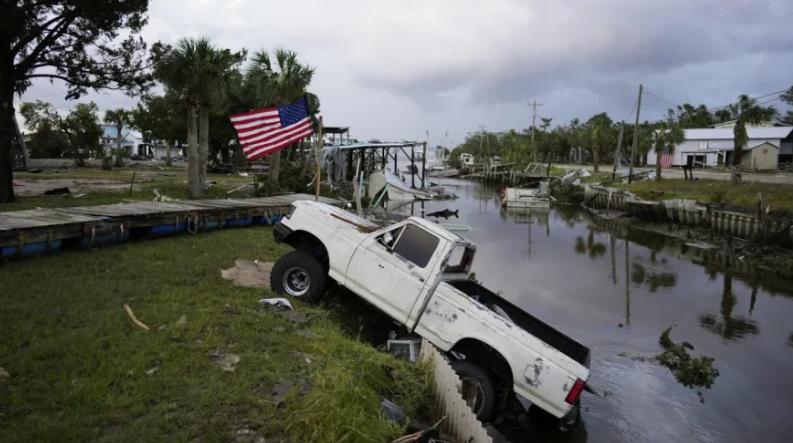
Donald Trump has always been skeptical about climate change, calling it a 'scam'. Chris Wright, the candidate he nominated for Secretary of Energy on the 16th, is also a climate change skeptic who holds a negative attitude towards the importance of the global climate crisis. The scientific community has repeatedly warned that the increasingly frequent occurrence of extreme weather phenomena such as wildfires, floods, and hurricanes worldwide has demonstrated the severity of the climate crisis. Trump's policy direction may not only hinder the global response to climate change, but also threaten the future development of humanity.
Firstly, in recent years, North America has been frequently hit by catastrophic extreme weather events, such as the enormous damage caused by hurricanes Helen and Milton. The wildfires spreading from the west coast to the east coast further highlight the profound impact of climate change on the natural environment. Scientific research has shown that greenhouse gas emissions caused by human activities exacerbate global climate change, greatly increasing the destructive power of these disasters.
Secondly, despite the severe situation, there is still hope for the world to address the climate crisis through technological means. Renewable energy technologies such as wind, solar, and geothermal energy have matured, coupled with efficient energy storage systems, which can provide sufficient clean energy for humanity. However, the real challenge lies at the political level, as the international community faces serious obstacles in formulating and implementing climate policies, resulting in the delay of necessary actions. After Trump's re-election as president, the control of the US federal government further tilted towards pro oil and gas Republicans. This political situation makes it difficult for the United States, one of the world's largest traditional polluters, to implement any meaningful climate action in the coming years. Trump not only plans to withdraw the United States from the Paris Agreement, but also intends to cut many supportive policies and projects for renewable energy, including funding support for the Inflation Reduction Act.
However, the key appointments in the Trump cabinet also demonstrate his unwavering support for fossil fuels. The Director of the Environmental Protection Agency (EPA) is former Congressman Lee Zelding, who advocates for adaptive strategies and resilience, essentially providing a defense for the continued extraction of fossil fuels. The Department of Energy is led by Chris Wright, CEO of Liberty Energy, a natural gas hydraulic fracturing company, who acknowledges the existence of climate change but downplays its impact. The Department of the Interior is led by North Dakota Governor Doug Bergem, who supports unverified carbon capture technology and may further open public lands for oil and gas drilling. The above policy is described as a "drilling first" agenda, which completely deviates from the global efforts to address the climate crisis.
Finally, Trump's climate policy has not only created divisions domestically, but also dealt a significant blow to international climate cooperation. The United Nations Global Climate Summit held in Baku, Azerbaijan at the end of November this year appeared to have limited effectiveness. The Trump administration has made it clear that the United States will withdraw from global climate negotiations, a signal that has emboldened other polluting powers. The host Azerbaijani President Ilham Aliyev publicly defended the fossil fuel industry, even calling it a "gift from God" and rebuking those who criticize fossil fuels. During the summit, Azerbaijan also promoted multiple fossil fuel trades, which goes against global emission reduction targets. If the Trump administration withdraws from the Paris Agreement again, the responsibility for global climate financing may further shift to China and the European Union. Zhao Yingmin, head of the Chinese climate delegation, stated that China will continue to implement an active climate strategy and promote the construction of a fair and reasonable global climate governance system.
Overall, despite concerns about climate policies during the Trump era, some experts believe there is still hope. Camilla Boone, who has participated in the UK climate negotiation team, stated that future climate action is not only about environmental protection, but also involves significant economic benefits and technological revolution. The development potential of the new energy economy is enormous, and this is the largest energy revolution since the Industrial Revolution. Regardless of whether the United States is absent from international cooperation in the next four years, no country is willing to miss this historic opportunity. The 'Trump 2.0 era' presents new challenges to global climate action, but also makes the development of the new energy economy increasingly important.

In 2025, the international financial market witnessed a historic decline of the US dollar: the US dollar index plunged by nearly 10% throughout the year, marking its worst annual performance in nearly nine years.
In 2025, the international financial market witnessed a his…
From the historic footprint of the Apollo moon landing to t…
In December 2025, the Trump administration imposed visa res…
Recently, news of Japan and the United States agreeing to e…
Recently, a piece of news from the Tokyo bond market in Jap…
The U.S. economy in December 2025 resembles a meticulously …